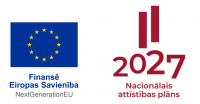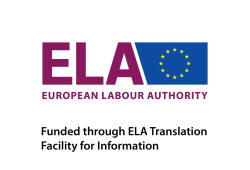Recovery Fund Project ‘Upskilling for adults’ No 3.1.2.5.i.0/1/23/I/CFLA/001
Objective of the active employment programme ‘Training with the employer’, implemented under the Recovery Fund Project ‘Upskilling for adults’ (Project No 3.1.2.5.i.0/1/23/I/CFLA/001) (hereinafter referred to as the ‘Programme’): for certain professions, the employer needs to provide practical training to an employee through training at the workplace.
The programme is designed for unemployed individuals registered with the National Employment Agency (hereinafter ‘the Agency’) who meet the qualification requirements laid down by the employer and who have not been employed by this employer for at least 12 months prior to participation in the Programme.
Employers who may apply for the Programme:
- Economic operators (except for educational establishments whose main purpose is the implementation of educational programmes);
- Self-employed persons
- Individual enterprises (including farms);
- Associations (except for political parties) or foundations.
Financial support to employers during the implementation of the Programme:
- A grant for a client’s salary in the amount of 60% of the national minimum monthly wage;
- A grant for the remuneration of a supervisor in the amount of EUR 10 per day of work supervision.
- A one-off grant for the purchase of personal protective equipment provided for by law upon taking up employment, up to a maximum of EUR 100.
Additional financial support shall be provided to persons with disabilities:
- Mandatory national social insurance contributions in proportion to the client’s salary grant;
- A one-off grant for adaptation of the workplace for a disabled client, up to a maximum of EUR 1 000 per workplace (including delivery and installation costs).
* The duration of the client’s participation in the Programme shall be 3 months for which the Agency provides financial support.
** During the implementation of the Programme, all other costs provided for in the labour legislation (e.g. additional payments, bonuses, illness allowances, holiday payments, etc.), including those defined as private co-financing, shall be covered by the employer.
***Persons with disabilities may receive a sign language service up to a maximum of 40 hours of direct interpretation per week, in proportion to the number of hours the client spent in the Programme. Persons with disabilities who have been diagnosed with mental disorders may receive a care worker’s service of up to 40 working hours per week.
How can employers apply for the Programme?
- step
- Register a vacancy on the Agency’s CVs and vacancies portal, select a client from the appropriate target group by selecting applicants supported by the Agency or by mutual agreement with the client. Complete the application form and attach the required information.
- step
- A completed application for the implementation of the ‘Training with the employer’ programme, signed with a secure electronic signature, must be submitted to the Agency via an official electronic address (e-address).
- step
- The Agency must set up a Selection panel to implement active employment measures, which reviews the applications submitted by the employers and approves or rejects the creation of practical training places for employers.
- step
- The Agency informs the employer in writing of the decision taken and, in the event of a positive reply, requests them to conclude a contract for the implementation of the Programme within one month of the date of entry into force of the decision of the Selection panel.




